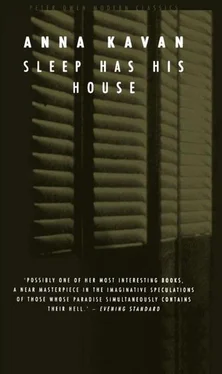At the centre, in tiered majestic gradations, there soar, enormously, steps of intense and dazzling white alabaster. Endless streams of angelic figures move in stately procession up and down this colossal stairway which presumably leads to the Throne.
On the right, seen panoramically at a lower level, a sort of huge skating-rink, blastingly bright and surrounded by dense gold-crowned, white-robed crowds. From here rises, very remote, very impressive, words indistinguishable, a vast volume of community hymn-singing with vox humana and massed bands accompaniment. When the communal howl dies away there is a sharp prolonged staccato rattle, something like a burst of machine-gun fire, as the saints pitch their crowns on to the glittering surface in front of them.
Now, at the extremities of the stair, appear seraphim whose lifted trumpets discharge notes in crisp upward cadence. The crowds on the right relax after their vocalism, break into groups, laughing and talking, and slowly begin to disperse. They give the impression of lighting up cigarettes, pushing their haloes on to the backs of their heads and then putting their hands in their pockets, although of course they don’t do these things. While they are strolling away a band of children romp gaily at the foot of the stairs, playing touch-last with the cherubs, whose muslin wings are attached to their shoulders by braces of tinsel braid. The children are all about the same age, twelve to fourteen years old, sexually indeterminate, very china-dollishly pretty, with rosebud mouths and beautiful curly hair.
The little girl B (she is an unobtrusive spectator in the foreground) watches the children admiringly as they dance into the fields and begin making the flowers into chains and posies. (As each flower is picked another immediately springs up in its place.)
B is obviously very much charmed by all that she sees, although slightly overawed. She stands first on one foot and then on the other, looking all round, anxious not to miss anything, but not liking to move away from a bush which partly conceals her and is somewhat ostentatiously decorated with large silver twinkling stars.
The whole scene is humming with holy business, cheerful and social and sanctified at the same time; there is an audible hum too, the articulation of eternal, collectivized, innocent pleasure, a confused burble of music and distant singing; laughter, water, harps, birds, bells. Suddenly all this is stilled. Silence. A single bell chimes solemnly and with resonancefar away.
The smiles fade from the lips of the angels, the saints break off what they are saying and look grave, the children stand quietly with serious faces, the flowers hanging down in their hands. Every head turns in the same direction.
B looks to see what it is they are all looking at. While she has been facing the other way, A has appeared from some unnoted point, and now crosses the foreground, dressed all in black. She walks not slowly and not quickly, but in immense isolation, utterly separate from the shining crowds, at whom, in passing, she glances without envy or interest.
Timidly forsaking the bush which shelters her, B steps forward, starts after her mother.
At the same moment, two executives of the angelic order, severe in their robes, their faces shadowed by long pointed wings, advance, linked by a property arch which they carry between them. The arch, made out of gun-metal-coloured paper (the sort in which silver is sometimes wrapped to keep it from tarnishing), simulates a subway approach and bears a small neon sign in red letters EXIT TO HELL.
Supported by an angel on each side, the arch is set on the ground. The audience looks uneasily from side to side, whispers flying about. A walks under the arch with a strictly impassive face: she seems not to notice where she is going. The seraphim at the foot of the stairs raise their trumpets. The saintly crowds shift, shuffle, whisper, stare, lean forward, expressions of deploring pietude glazing avid curiosity; stare, seasoning sempiternal brightness with the zest of distant but contemporaneous shade.
The first notes of the trumpets are blown.
Just as the angels are preparing to carry the arch away B makes a desperate dash at it and dives through.
Everything blacks out — as if in an abrupt dense smoke-screen — as successive curtains of darkness are drawn. The faces of the child-angels last longest, porcelain painted with Os of insipid disparagement. On the obliteration of the last doll face, the hymn singing, very distantly, starts up again and continues, diminishing into final inaudibility, for a few seconds more.
What happens when you start on the downward trip? The elevator doors clang shut, a suffocating infernal wind roars up the shaft, it seems as though you’ll never get to the bottom; there’s plenty of time to wonder what’s coming and to wish yourself somewhere else. Of course there isn’t a hope of ever getting out again into the light. Once you’re on your way down the machinery takes charge of you, you’re caught, trapped, finished for good and all. Certainly there are legends about individuals who have escaped, even after reaching the final platforms. But these are heroes, fabulous figures who perhaps never really existed except as projections of wishful thinking in the minds of ordinary people. At any rate, they are far too dubious and remote to be of any real moral support or to provide any justifiable basis for optimism. You might just as well give in and pluck the cruel thorn of hope out of your heart. It’s always less painful to surrender to the stream of events than to turn yourself into a dam to be battered and pounded. It’s true that if the worst comes to the worst you’ll be drowned: but that’s better than being beaten to a jelly; and there’s always a slight chance that you may get washed ashore somewhere before the end.
And now, with regard to this drop into the lower regions, things really might be much worse. It’s no good pretending that you get the gaiety down here. You don’t get the variety or the excitement or the social or cultural life. If those were the things you were after you should have been much more prudent, you should have hung on to your original identity disk, number billion-billion-billion-whatever of the collectivists, instead of losing it somewhere or throwing it away in a fit of bravado. Then you could have trooped along to paradise with the rest and been one of the crowd for-ever-and-a-day. But since it’s happened like this, since you’ve been thrown out on your ear by the celestial party, or thrown yourself out, it makes no difference which way you put it, the only thing left is to adapt yourself as well as you can.
It’s lonely? Sure, it’s lonely. That’s what you asked for, didn’t you? After all, if you hadn’t been too superior for the gang, you wouldn’t be here. And think how much more distinguished it is to be on your own, or with one or two individualists like yourself, than to be an ordinary gregarious animal going about with the herd.
You miss the sun and air? Sure, you do. There are some million miles of solid obstruction between you and the free place where the wind blows and the birds sing in the sunshine. You’ll never feel the sun warming you any more. You’ll never hear the birds. No bird could live in this atmosphere, this ersatz air that eddies here in stale and fetid artificial gusts. But you can breathe in it and like it too. And in the end it will smell sweeter to you than a sea-breeze, just as this dim, unvaried and unfresh light will suit your eyes better than the vulgar sun.
You don’t like it here? Why didn’t you keep out, then, for God’s sake, while you had the chance? Anyhow, it’s no good moaning and snivelling now. Put a good face on it. Be tough. Show the crowd you can take it. You’re an individualist, aren’t you? To hell with the crowd. What do you care about them? You’re here because you’ve got no time for the crowd. What do you care about them and their damnfool heaven? To hell with heaven, anyway.
Читать дальше












